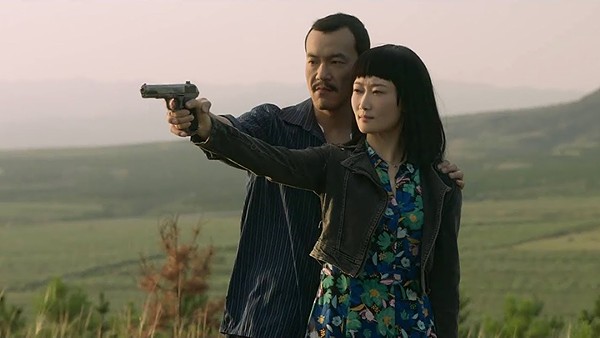Ash Is Purest White
Ash Is Purest White FL, 2018, 1 ½ stars
Purest reductivism
Chinese saga more commentary than narrative
From The Orlando Weekly, April 5, 2019
In Ash Is Purest White, writer-director Zhangke Jia (A Touch of Sin) is less concerned with narrative clarity than with painting an impressionistic portrait of modern China. The result is slightly abstract and mostly minimalistic – so minimalistic it reaches reductivism.
Qiao is a young woman eager to escape her rural, coal-mining village, which is being slowly ruined by a changing economy. She prefers palling around with gangsters and hosting mahjong tournaments in dance halls. It’s there she meets Bin, an up-and-coming businessman whose future blossoms unexpectedly when his boss meets an untimely end.
As Bin and Qiao’s power and stress grow, they visit a beautiful spot in the countryside, presumably to look for a place to build a house or maybe just relax. (Details like this are often left ambiguous or, even more frustratingly, explained several minutes after we’ve lost interest.)
Wondering whether a nearby volcano is still active, Qiao remarks, “Volcano ash is very pure, isn’t it? … Anything that burns at high temperature is made pure.”
Referencing the location’s remoteness, Bin responds, “No one would know if you burned to a crisp.”
This conversation is one of the film’s few elements that work on both a literal and metaphorical level, as the couple might as well be discussing their own future careers, which will incinerate their dreams. And Zhangke’s script follows that fire, randomly and episodically, through a 17-year odyssey of crime, punishment, abandonment, drift and eventual – though bittersweet – reconciliation. Those five descriptors could actually be the chapter headings in this odd, haunting, but ultimately tedious attempt to reinterpret mafia movies in a style more akin to David Lynch than Francis Ford Coppola or Martin Scorsese.
The film’s failings are not uncommon to the cinema of reductivism, in which central moments of the narrative are removed, along with character development. The filmmaker assumes you can fill in the blanks and instead concentrates on the smaller moments that you aren’t able to intuit. It’s the pretentious cinema of adjectives and adverbs, with the nouns and verbs nowhere to be seen. In this instance, the result is a unique but misplaced commentary on modernism and cultural identity.
As Qiao, Tao Zhao is often mesmerizing in her stoic resolve. Fan Liao, as Bin, also possesses a quiet magnetism. But the supporting performers add little to the haphazard story, which feels both too long and underdeveloped. At best, these secondary performers leave us wanting more, and not in a good way. At worst, they are as wooden as the mahjong pieces pedaled by Qiao and further damage this Chinese-language production, which is plagued by questionable decisions and inconsistent aesthetic choices.
“You’ve watched too many gangster movies,” Qiao tells Bin when the latter flashes an illegal gun.
Zhangke probably has seen too many as well, which might partially explain his radical rewriting of the genre. He deserves points for originality, not to mention the stunning shooting locations, but this is an offer you can and should refuse.
© 2019 Orlando Weekly / MeierMovies, LLC
